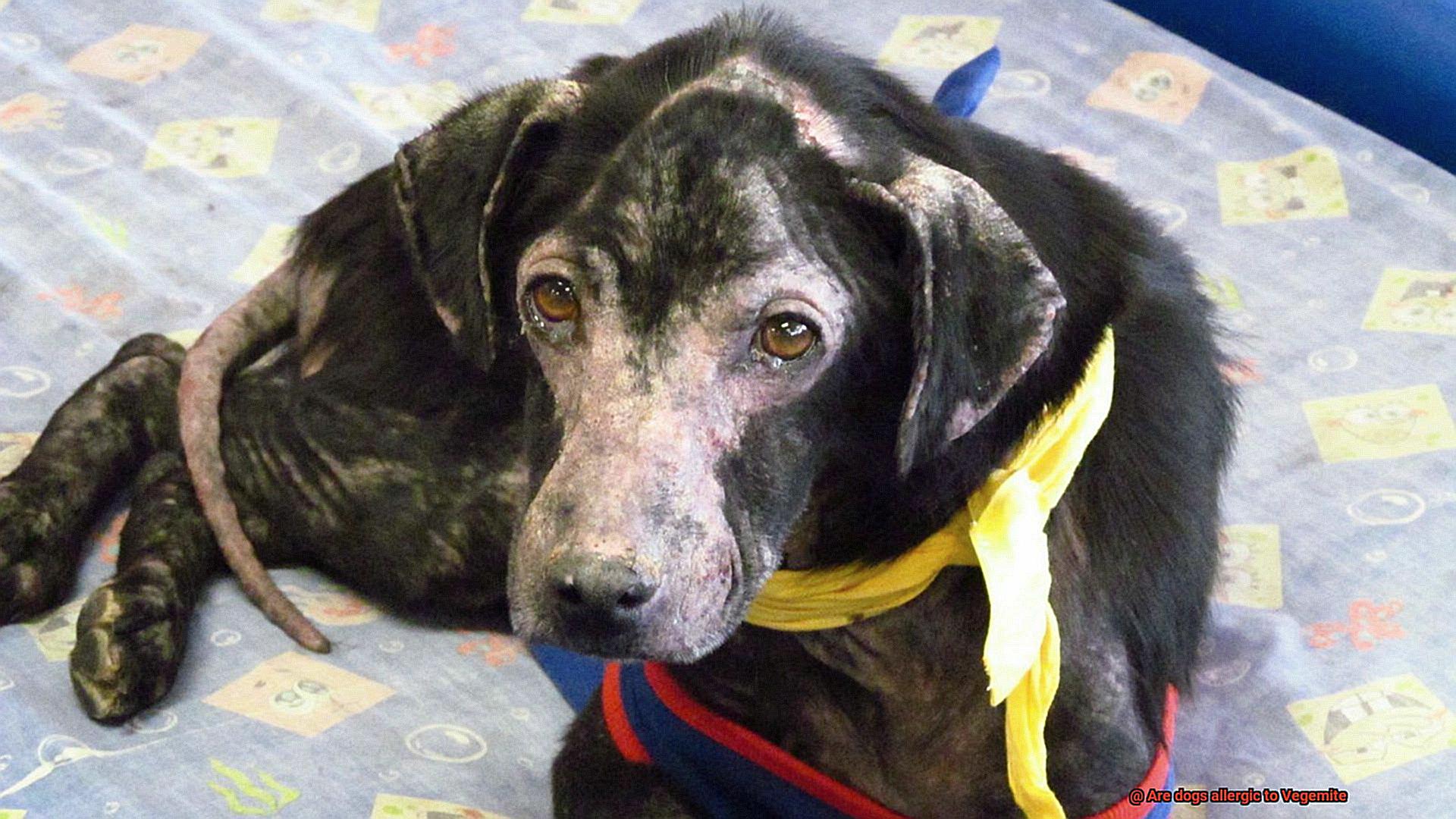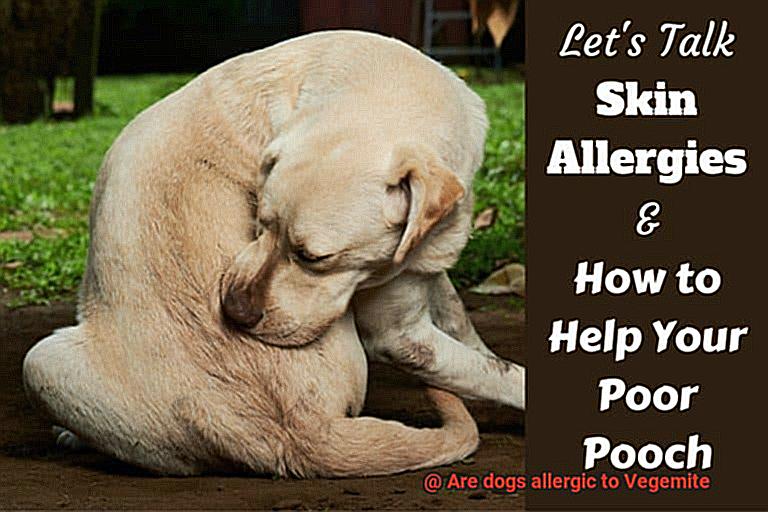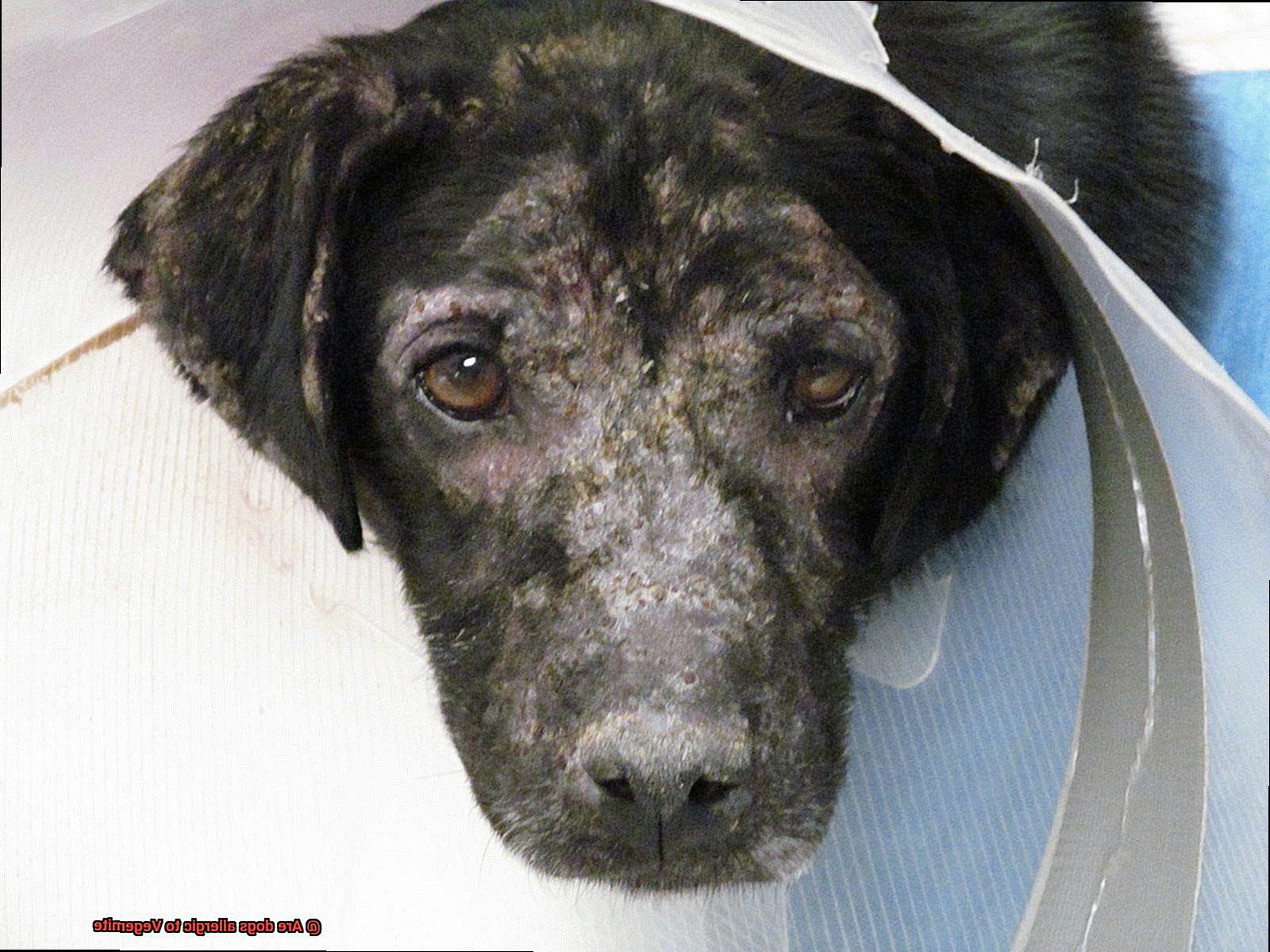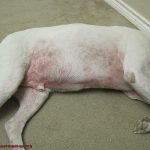Are dogs allergic to Vegemite?
Today, we’re diving into a burning question that has puzzled dog owners Down Under for ages – can our furry mates handle the mighty Vegemite? This iconic brown spread has been tantalizing Aussie taste buds for generations, but what about our four-legged companions? Are they missing out on this quintessential Aussie delicacy, or is it best to keep their paws off the jar?
Vegemite is a staple in many Aussie households, but its compatibility with our canine friends remains a mystery. In this blog post, we’ll uncover the truth behind canine allergies and explore whether dogs can truly handle the magic of Vegemite.

So grab your cuppa and gather ’round because we’re about to embark on an adventure to solve this crunchy question. Whether you’re a proud owner of an Aussie pooch or just curious about their dietary quirks, this bone-appétit blog post is here to enlighten us all. Let’s kick off our Vegemite journey together, shall we?
Yeast Allergies in Dogs: Causes and Symptoms
Contents
- 1 Yeast Allergies in Dogs: Causes and Symptoms
- 2 Is Vegemite Safe for Dogs?
- 3 How to Identify a Yeast Allergy in Your Dog
- 4 Common Signs of an Allergic Reaction in Dogs
- 5 The Potential Risks of Feeding Your Dog Vegemite
- 6 Are French Bulldogs Prone to Yeast Allergies?
- 7 Feeding Your Dog Vegemite: What You Should Know
- 8 Tips on Avoiding Allergic Reactions in Dogs
- 9 Conclusion
Today, we’re diving into a common issue that our furry friends may face – yeast allergies. Just like us, dogs can develop allergies to certain substances, including yeast. In this article, we’ll explore the causes and symptoms of yeast allergies in French Bulldogs to help you better understand and manage this pesky condition.
Causes of Yeast Allergies in French Bulldogs:
- Overgrowth of yeast on the skin or in the ears
- Weakened immune system
- Poor diet
- Medical conditions
- Allergies (food and environmental)
Symptoms of Yeast Allergies in French Bulldogs:
- Itching – excessive scratching, paw licking, and rubbing against furniture
- Redness, inflammation, and sores on the skin
- Foul odor due to yeast overgrowth
- Ear infections – head shaking, scratching at ears, and discharge with an unpleasant smell
- Digestive issues – diarrhea, vomiting, and gas

Diagnosis and Treatment:
To ensure an accurate diagnosis, it’s essential to consult with a veterinarian. They will conduct a thorough physical examination and may recommend additional tests, such as skin scrapings or allergy testing.
Treatment typically involves addressing the underlying cause and managing the symptoms:
- Dietary changes – switch to a limited ingredient or grain-free diet to reduce yeast overgrowth
- Regular grooming and cleaning of affected areas
- Medications – antifungal treatments to eliminate yeast overgrowth and relieve itching and inflammation
Remember that each French Bulldog is unique, so it’s crucial to work closely with your veterinarian to develop a tailored treatment plan for your pup.
Prevention Tips:
- Maintain a healthy diet for your French Bulldog with balanced nutrition.
- Keep your pup’s skin and ears clean and dry.
- Avoid overusing antibiotics, as they can disrupt the balance of bacteria and yeast in the body.
- Minimize exposure to potential allergens, both in food and the environment.
- Regularly monitor your French Bulldog for any signs of allergies or discomfort.
Is Vegemite Safe for Dogs?
As an expert in dog nutrition, I’m here to spill the beans (or should I say yeast?) and give you the lowdown on why Vegemite is a big no-no for your Frenchie.
The Salty Truth:
Let’s start with the elephant in the room – Vegemite’s saltiness. While we Aussies love that savory punch, our furry friends don’t share the same taste buds. Dogs have different dietary needs, and excessive salt intake can throw their electrolyte balance out of whack, causing dehydration and potential health issues. For dogs with kidney or heart problems, this salty spread can be downright dangerous, mate.
The Garlic and Onion Conundrum:
Now, let’s talk about those sneaky ingredients lurking in Vegemite – garlic and onion powder. While they add flavor to our Vegemite toasties, these ingredients are toxic to dogs. They can damage their red blood cells, leading to anemia and other serious complications. As much as our Frenchies may beg for a taste of our Aussie delight, it’s best to keep the Vegemite jar out of their reach.
Yeast Sensitivities:
Did you know that some dogs can be allergic or sensitive to yeast? Although yeast extract in Vegemite is generally safe for most dogs, those with existing yeast sensitivities or allergies may experience digestive upset or other adverse reactions. We don’t want our fur babies feeling ruff after indulging in a Vegemite snack, do we?
The Bottom Line:
To put it simply, Vegemite is not safe for dogs, especially French Bulldogs who are prone to certain health issues. Even a small amount can wreak havoc on their delicate systems. So, let’s keep the Vegemite for ourselves and opt for dog-specific foods and treats that cater to our furry friend’s nutritional needs.
How to Identify a Yeast Allergy in Your Dog
Yeast allergies can make our furry friends feel uncomfortable and sick. French Bulldogs, with their adorable bat-like ears and lovable personalities, are prone to yeast allergies. It’s important to know how to identify these allergies so we can keep our Frenchies happy and healthy. Here are some tips to help you spot the signs of a yeast allergy in your French Bulldog.
Watch out for itchy skin:
If your French Bulldog is constantly scratching, biting, or licking themselves, it could be a sign of a yeast allergy. Check for redness, inflammation, or even hair loss on their skin. Pay special attention to their paws and ears, as these are common areas that can be affected by yeast allergies.

Keep an eye on their ears:
French Bulldogs have adorable floppy ears, but these can also be prone to yeast infections. If you notice your Frenchie shaking their head frequently, scratching at their ears, or if there’s a foul odor or discharge coming from their ears, it could be a sign of a yeast allergy.
Look out for digestive issues:
Yeast allergies can also affect your French Bulldog’s tummy. If your Frenchie has frequent bouts of diarrhea, vomiting, bloating, or excessive gas, it could be due to a yeast allergy. Keep an eye on their poop and observe any changes in their eating habits.
Monitor respiratory problems:
In some cases, French Bulldogs with yeast allergies may experience respiratory problems. Look out for coughing, wheezing, or difficulty breathing. If your Frenchie shows any signs of respiratory distress, it’s important to consult with a veterinarian immediately.
Consult with your vet:
If you suspect that your French Bulldog has a yeast allergy, it’s crucial to consult with a veterinarian for an accurate diagnosis. Your vet can perform tests and provide guidance on how to manage your Frenchie’s condition.
Common Signs of an Allergic Reaction in Dogs
It’s true. And as responsible pet owners, it’s crucial to be able to identify the signs of an allergic reaction in our Frenchies, so we can keep them feeling their best. In this guide, we’ll dive into the common signs of allergic reactions in French Bulldogs, helping you become your Frenchie’s allergy detective.
Itchy Skin: The Telltale Sign
French Bulldogs with allergies often experience itchy skin. Keep an eye out for excessive scratching, biting, or licking of their paws, belly, or other body parts. If you notice redness, rashes, hives, or hair loss, it could be a sign that your Frenchie is having an allergic reaction.
Ears on Alert:
French Bulldogs have those adorable bat ears that make them unique, but they’re also prone to ear allergies. Watch out for signs of ear infections such as redness, swelling, foul odor, discharge, or constant head shaking. If your Frenchie seems uncomfortable or keeps scratching their ears, it’s time to investigate their allergy status.
Digestive Distress: A Sensitive Tummy
Allergies can wreak havoc on a French Bulldog’s digestive system. Keep a close eye on their bowel movements – frequent diarrhea or vomiting could indicate an allergic reaction. Changes in appetite or excessive gas are also common signs to watch out for.
Respiratory Rumbles:
Just like us humans, French Bulldogs can experience respiratory symptoms during an allergic reaction. Keep your ears open for coughing, sneezing, wheezing, or difficulty breathing. Nasal discharge or congestion might also indicate an allergic response.
A Swelling Surprise:
Swelling is another possible sign of an allergic reaction in French Bulldogs. Keep a close eye on your Frenchie’s face – if you notice facial swelling, particularly around the eyes, muzzle, or lips, it’s time to consult your vet. Swollen limbs or other body parts should also raise concern.
The Potential Risks of Feeding Your Dog Vegemite
As a proud French Bulldog owner, you want to ensure that your furry friend stays healthy and happy. While sharing meals with your pup can be a bonding experience, it’s important to be aware of potential risks associated with certain human foods, including Vegemite.
In this article, we’ll explore the potential dangers of feeding your French Bulldog Vegemite and why it’s best to avoid this Australian spread.
High Salt Content:
Vegemite contains high levels of salt, which can be harmful to dogs if consumed in large quantities. Excessive salt intake can lead to sodium ion poisoning, causing symptoms like vomiting, diarrhea, increased thirst, seizures, and even death in severe cases. To keep your French Bulldog safe, it’s best to avoid giving them Vegemite altogether.
Allergenic Ingredients:
Vegemite contains yeast extract, which can trigger allergic reactions in some dogs. French Bulldogs are known to have sensitive skin and are prone to allergies. If your Frenchie has a history of food allergies or sensitivities, it’s best to steer clear of Vegemite to prevent any potential allergic reactions. Symptoms of food allergies in dogs include itching, skin rashes, digestive issues, and respiratory problems.
Overwhelming Flavor:
French Bulldogs may have their own unique taste preferences. The strong and concentrated flavor of Vegemite may be too overwhelming for their sensitive taste buds. Some dogs may develop an aversion to strong flavors or experience gastrointestinal upset after consuming Vegemite. It’s important to respect your pup’s preferences and stick to a diet that suits their needs.
Nutritional Imbalances:
While Vegemite contains some vitamins and minerals, it is not a balanced diet for dogs like French Bulldogs. These adorable pups require a specific balance of proteins, fats, carbohydrates, vitamins, and minerals to thrive.
Feeding them a diet primarily consisting of Vegemite can lead to nutritional deficiencies or imbalances over time. It’s best to consult with your veterinarian to ensure your Frenchie receives a well-balanced diet.
What to Do If Your French Bulldog Ingests Vegemite:
If you suspect that your French Bulldog has ingested Vegemite or any other food that may pose a risk, it’s crucial to monitor their symptoms closely and seek veterinary assistance if necessary. Your veterinarian will be able to assess the situation and provide appropriate guidance or treatment.
Are French Bulldogs Prone to Yeast Allergies?
French Bulldogs, like all dogs, can be prone to various allergies, including yeast allergies. But what makes French Bulldogs more susceptible to yeast allergies compared to other breeds? Let’s dive into the unique characteristics of French Bulldogs and explore why they may be more prone to yeast allergies.
Wrinkled Skin and Skin Fold Dermatitis

French Bulldogs are known for their adorable wrinkled skin, which adds to their charm. However, these wrinkles can create a perfect environment for yeast to thrive. The warm and moist environment within the folds of their skin can lead to an overgrowth of yeast, causing allergic reactions. It is essential for French Bulldog owners to regularly clean and maintain their pet’s skin folds to minimize the risk of yeast infections.

Food Sensitivities and Intolerances
Another factor that can contribute to yeast allergies in French Bulldogs is their tendency to have food sensitivities or intolerances. Certain ingredients commonly found in dog foods, such as grains and carbohydrates, can promote yeast growth in the body. To minimize the risk of yeast allergies, French Bulldog owners should carefully choose their pet’s diet, considering hypoallergenic or grain-free options that minimize yeast-promoting ingredients.
Environmental Allergies
French Bulldogs are also known for their susceptibility to environmental allergies. Pollen, mold spores, dust mites, and other allergens present in the environment can trigger or exacerbate yeast allergies in French Bulldogs. When a French Bulldog with environmental allergies scratches or chews at their skin due to itchiness, it can create an entry point for yeast to infect the damaged area.
Managing Yeast Allergies in French Bulldogs
To manage yeast allergies in French Bulldogs, it is crucial to address the underlying causes. Here are some tips:
- Regularly clean and maintain your French Bulldog’s skin folds using a damp cloth or specialized wipes recommended by veterinarians.
- Keep the skin dry and well-ventilated to minimize the risk of yeast infections.
- Consider a specialized hypoallergenic or limited ingredient diet, recommended by your veterinarian, that excludes common allergens and ingredients that promote yeast growth.
- Minimize exposure to environmental allergens, provide appropriate flea and tick prevention, and use prescribed medications to manage symptoms.
- Regular veterinary check-ups are essential to identify and treat any underlying health issues contributing to yeast allergies.
Feeding Your Dog Vegemite: What You Should Know
As a dog owner, you probably want to share all of life’s delights with your furry friend, including the delicious taste of Vegemite. But before you grab that jar and spread it on your pup’s favorite treat, there are a few things you should know to ensure their safety and well-being.
The Potential Risks
- Allergies: Dogs, just like humans, can be allergic to a wide range of foods, including yeast. While there is no specific research on dogs and Vegemite allergies, it is generally advised to avoid feeding dogs any food that contains ingredients they may be allergic to. It is always best to consult with your veterinarian before introducing Vegemite or any new food into your dog’s diet.
- High Salt Content: Vegemite is known for its strong and salty taste, and dogs should not consume excessive amounts of salt. High levels of salt can lead to dehydration, electrolyte imbalances, and even kidney problems in dogs. It is important to remember that Vegemite should only be given as an occasional treat in small amounts to prevent any potential health issues.
The Potential Benefits
While there are potential risks associated with feeding your dog Vegemite, there may also be some benefits when given in moderation:
- Flavorful Treat: The strong taste of Vegemite can be a flavorful addition to your dog’s diet. It can add variety and excitement to their mealtime routine.
- Mental Stimulation: Dogs, especially those with a discerning palate, can benefit from the mental stimulation that comes with trying new flavors. Introducing small amounts of Vegemite as an occasional treat can engage their senses and provide enrichment.
Alternatives to Consider
If you’re looking for alternative spreads or treats for your dog, there are many commercially available options specifically formulated for canine consumption. These products are designed to be safe, nutritious, and delicious for your furry friend. Some popular options include peanut butter (make sure it does not contain xylitol, which is toxic to dogs), pumpkin puree, and dog-friendly spreads made from fruits or vegetables.
Always Consult Your Veterinarian
When it comes to feeding your dog new foods, it is always best to consult with your veterinarian. They can provide personalized advice based on your dog’s specific needs and help you make informed decisions about their diet. Remember, your vet is the ultimate expert when it comes to your dog’s health and well-being.
So, while Vegemite may be a beloved Australian spread, it’s important to approach feeding it to your dog with caution. Consult with your veterinarian, consider the potential risks and benefits, and always prioritize your dog’s health and safety. After all, a happy and healthy pup is the ultimate goal.
Tips on Avoiding Allergic Reactions in Dogs
French Bulldogs are beloved pets known for their adorable appearance and friendly personalities. However, just like humans, these furry friends can suffer from allergic reactions. As a dog owner and allergy expert, I understand the importance of preventing these reactions to ensure our French Bulldogs live happy and healthy lives. In this article, I will share valuable tips and insights on how to avoid allergic reactions in French Bulldogs.
Food Allergies:
French Bulldogs, like other breeds, can develop allergies to certain foods. Common allergens include wheat, soy, and dairy. To prevent allergic reactions, carefully read ingredient labels and choose dog foods that are free from these allergens. When introducing new foods, do it gradually and monitor your dog for any adverse reactions.
Environmental Allergens:
Pollen, dust mites, and mold spores are environmental allergens that can trigger allergies in French Bulldogs. Keep your dog’s environment clean by regularly vacuuming and washing bedding. Close windows during peak allergy seasons to minimize exposure.
Flea Prevention:
Flea bites are another common trigger for allergic reactions in dogs. Protect your French Bulldog from fleas by using veterinarian-recommended flea prevention products. Regular grooming and checking for signs of fleas can also help prevent infestations.
Medication and Topical Products:
Some French Bulldogs may have allergic reactions to certain medications or topical products. Inform your veterinarian about any previous allergies or sensitivities your dog may have had. They can prescribe alternative medications or recommend suitable products to avoid allergic reactions.
Observing Symptoms:
Be observant and proactive in monitoring your French Bulldog for signs of allergic reactions. Common symptoms include itching, redness, swelling, sneezing, coughing, and gastrointestinal issues. If any of these symptoms are observed, consult with a veterinarian for proper diagnosis and treatment.
-SbtoLuLYvQ” >
Conclusion
In conclusion, it is important to note that while some dogs may have allergies or sensitivities to certain ingredients found in Vegemite, it cannot be generalized that all dogs are allergic to it.
Each dog is unique and may react differently to different foods. If you suspect your dog may be allergic to Vegemite or any other food, it is best to consult with a veterinarian for proper diagnosis and guidance.
Remember, the health and well-being of our furry friends should always be our top priority.




